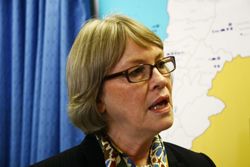 BEIRUT, 2007 (IRIN) – Rebuilding Nahr al-Bared, the northern Palestinian refugee camp devastated by a three-month conflict between the army and Islamist militants, will be one of the largest humanitarian projects ever undertaken by UNRWA, the UN
BEIRUT, 2007 (IRIN) – Rebuilding Nahr al-Bared, the northern Palestinian refugee camp devastated by a three-month conflict between the army and Islamist militants, will be one of the largest humanitarian projects ever undertaken by UNRWA, the UN
 By Alistair Lyon, Special Correspondent, SIDON, Lebanon (Reuters) – Every day bulldozers pile more garbage on to a mountain of waste on the Sidon seafront in a symbol of Lebanon’s environmental problems, aggravated, activists say, by politics, mismanagement and greed. The dump, towering about 20 meters (60 feet) high near schools, hospitals and apartment blocks in Lebanon’s third biggest city, has partially collapsed into the Mediterranean at least twice, prompting complaints from Cyrpus, Syria and Turkey after currents swept rubbish on to their beaches.
By Alistair Lyon, Special Correspondent, SIDON, Lebanon (Reuters) – Every day bulldozers pile more garbage on to a mountain of waste on the Sidon seafront in a symbol of Lebanon’s environmental problems, aggravated, activists say, by politics, mismanagement and greed. The dump, towering about 20 meters (60 feet) high near schools, hospitals and apartment blocks in Lebanon’s third biggest city, has partially collapsed into the Mediterranean at least twice, prompting complaints from Cyrpus, Syria and Turkey after currents swept rubbish on to their beaches.
Last year, an oil spill caused by Israeli bombing of fuel tanks at the Jiyyeh power plant south of Beirut during a 34-day aroused international concern. However, most of Lebanon’s environmental blight is home-grown. Almost all its sewage is pumped untreated into the sea, with some chemical effluent from relatively small industrial clusters along a 225-km (140-mile) coastline disfigured by uncontrolled land reclamation and haphazard private construction. Lebanese boast of their country’s natural beauty, but many dump litter at roadsides and picnic sites without a second thought.
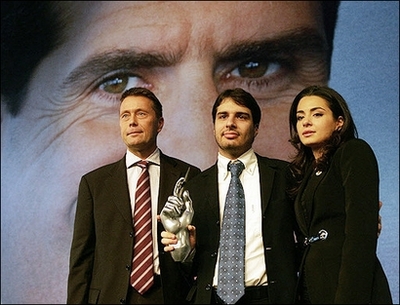 BEIRUT – The World Association of Newspapers on Sunday awarded the Gibran Tueni prize, named after the martyr MP and newsman, to a Lebanese journalist for writings focused on the freedom of expression. The award went to Michel Hajji Georgiou, senior political analyst at the French-language daily L’orient-le-jour, at a ceremony ahead of the second anniversary of Tueni’s assassination.
BEIRUT – The World Association of Newspapers on Sunday awarded the Gibran Tueni prize, named after the martyr MP and newsman, to a Lebanese journalist for writings focused on the freedom of expression. The award went to Michel Hajji Georgiou, senior political analyst at the French-language daily L’orient-le-jour, at a ceremony ahead of the second anniversary of Tueni’s assassination.
The coming second anniversary of the assassination of journalist and MP Gebran Tueni was commemorated on Sunday with the announcement of this year’s Gebran Tueni Award at the Beirut International Exhibition and Leisure Center. The ceremony was marked by a series of passionate and often emotional speeches given by members of the Tueni family, although the highlight of Sunday’s event was singer Majida al-Roumi’s riveting speech "Enough," which prompted a standing ovation from the audience of roughly 1,500. "Are we not all Lebanese? Did all those who fought in the North and South, did they not all fight because they are Lebanese?" asked Roumi. She was referring to the soldiers of the Lebanese Armed Forces (LAF) who died in the three-month conflict this year against Fatah al-Islam militants at the Nahr al-Bared Palestinian refugee camp in North Lebanon, as well as the Hizbullah fighters who died in the summer 2006 war with Israel. "Many may criticize me for expressing my thoughts on politics here today, but I do not care," she said. "I am here today to say: enough." "We are the ones who have to die for everyone else’s causes and everyone else’s wars," added Roumi.
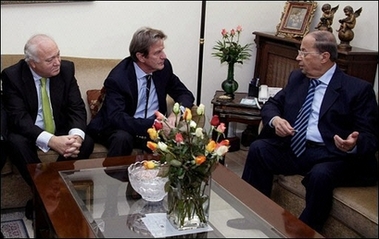 Beirut – Rival Lebanese leaders strived on Thursday to finalise a deal to have the army chief elected as president, but problems over amending the constitution persisted, despite the intervention of the French foreign minister. Parliament is due to convene Friday to elect a president. Army commander general Michel Suleiman has emerged as a candidate acceptable to the rival camps.
Beirut – Rival Lebanese leaders strived on Thursday to finalise a deal to have the army chief elected as president, but problems over amending the constitution persisted, despite the intervention of the French foreign minister. Parliament is due to convene Friday to elect a president. Army commander general Michel Suleiman has emerged as a candidate acceptable to the rival camps.
opposition leader General Michel Aoun,wants guarantees that his share of seats in the new cabinet will reflect the size of his parliamentary bloc – the biggest of any Christian faction. Aoun said Thursday that "the political vacuum in the country does not scare us" and reiterated that he wants political understanding before amending the constitution. Aoun reiterated he would only endorse Suleiman for two years until the 2009 parliamentary elections, and blamed the ruling majority for the deadlock. "I have made enough compromises and I will add a new demand every day," Aoun told a news conference. The ruling majority "led us to the void. They thought that the void would scare us…but it does not scare us and the presidency will always be there," he said. "If not now, in a week, if not, in a month or in a year. The country will not be destroyed, more than this current government has been destroying it," said Aoun. Kouchner met separately with Aoun, opposition-aligned Parliament Speaker Nabih Berri and legislator Saad Hariri, who leads the parliament majority. The diplomat discussed "the current political crisis … and efforts to complete the presidential election," state-run National News Agency said.
Another leading member of the anti-Syria coalition, former President Emile Gemayel, also indirectly blamed Aoun for the latest haggling, saying that "some have almost brought us back to square one with impossible conditions."Gemayel, whose Christian right-wing Phalange Party backs Suleiman for president, urged a speedy presidential vote.
BEIRUT (AFP) – The Lebanese army on Thursday banned civilians from wearing military-style clothing amid fears of unrest in the country facing political and security instability. Lately, citizens and party members have been wearing clothes similar to military fatigues," a military statement said on Thursday. "The current circumstances in the country require that we put […]
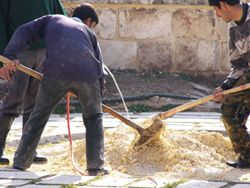 BEIRUT, 3 December 2007 (IRIN) – Radwan was fast asleep when three men broke down the door of his flat. They beat him. They broke one of his ribs. Then two held his arms while the third slashed his head with a knuckleduster. His crime, they told him, was to be a Syrian working in Lebanon.
BEIRUT, 3 December 2007 (IRIN) – Radwan was fast asleep when three men broke down the door of his flat. They beat him. They broke one of his ribs. Then two held his arms while the third slashed his head with a knuckleduster. His crime, they told him, was to be a Syrian working in Lebanon.
After Radwan – who like all Syrians interviewed by IRIN gave a false name for fear of retribution – went to the police, the thugs came back.
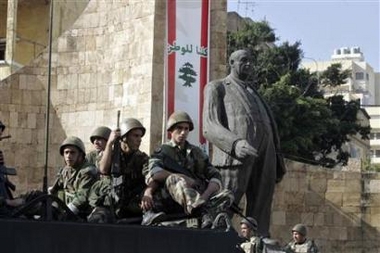 Last Christmas, the Maronite Patriarch Mar Nasrallah Boutros Sfeir told Lebanese Christians, "Do not be afraid." At first glance, the Lebanese did not seem afraid, not a bit. Despite all the turmoil they were going through, they still managed to put up their Christmas trees, go to nightclubs, dine at fancy restaurants and attend Fayruz. At second glance, however, the Lebanese had every reason to be afraid back then, and even more so today, one year later. Lebanon continues to suffer from the Israeli war in 2006, and the continued assassinations that have badly hit Lebanon’s economy — and tourism — since 2005 Then came the massive sit-in starting 2 December 2006 which at the time of writing, continues, with the aim of bringing down the cabinet of Prime Minister Fouad Al-Siniora. Now comes vacancy at the Presidential Palace.
Last Christmas, the Maronite Patriarch Mar Nasrallah Boutros Sfeir told Lebanese Christians, "Do not be afraid." At first glance, the Lebanese did not seem afraid, not a bit. Despite all the turmoil they were going through, they still managed to put up their Christmas trees, go to nightclubs, dine at fancy restaurants and attend Fayruz. At second glance, however, the Lebanese had every reason to be afraid back then, and even more so today, one year later. Lebanon continues to suffer from the Israeli war in 2006, and the continued assassinations that have badly hit Lebanon’s economy — and tourism — since 2005 Then came the massive sit-in starting 2 December 2006 which at the time of writing, continues, with the aim of bringing down the cabinet of Prime Minister Fouad Al-Siniora. Now comes vacancy at the Presidential Palace.
On 23-24 November 2007, Beirut seemed divided between those rejoicing at the exodus of President Emile Lahoud and those paying homage to a man whom they considered a great struggler. Lahoud left a vacant post at Baabda Palace. After weeks of negotiations, the Lebanese were unable to agree on a replacement. Neighbourhoods loyal to parliamentary majority leader Saad Al-Hariri celebrated with fireworks and young people dancing in the street.Syrian television aired a special documentary about him, saying that he was the man who helped unite Lebanon, in his capacity as army commander, in the 1990s. He helped liberate South Lebanon in 2000, and prevented Lebanon from becoming a satellite state of the United States and Israel. Other strong examples are Maronite chief Suleiman Franjiyeh, former prime ministers Omar Karameh and Najib Mikati, parliament speaker Berri, and Hizbullah leader Hassan Nasrallah. All of them upheld Lahoud as a constitutional president, after the Syrians departed in April 2005.
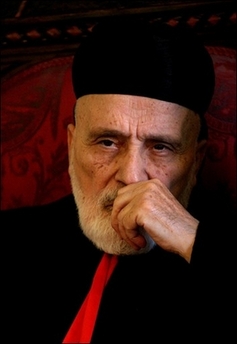 01 December 2007BEIRUT: Maronite Patriarch Nasrallah Butros Sfeir urged the opposition to end its boycott of the presidential election and elect a successor to former President Emile Lahoud. He warned the vote must be held "before it’s too late.""The present situation is dangerous and we wonder if any of those in charge, and those who avoid going to Parliament when an electoral session is called, appreciate the seriousness of the situation," Sfeir said in a statement issued Friday.
01 December 2007BEIRUT: Maronite Patriarch Nasrallah Butros Sfeir urged the opposition to end its boycott of the presidential election and elect a successor to former President Emile Lahoud. He warned the vote must be held "before it’s too late.""The present situation is dangerous and we wonder if any of those in charge, and those who avoid going to Parliament when an electoral session is called, appreciate the seriousness of the situation," Sfeir said in a statement issued Friday.
Sfeir said those who have closed Parliament "bear a huge responsibility," in clear reference to Speaker Nabih Berri, pointing to Parliament as "the natural place for MPs to gather to discuss national issues and take the necessary decisions." Sfeir further chided the opposition’s resigned Cabinet ministers who boycott Cabinet sessions while continuing to run their respective ministries."The Lebanese people are sick of these acts that contradict reason and law, and they wait for their representatives whom they elected to focus on people’s daily concerns, provide jobs for people so they can take care of their families and provide them a secure and dignified life," Sfeir said.
Sfeir said politicians’ commitment to one foreign power or another has made them all prisoners of their fixed positions and has paralyzed their capabilities. Quoting the late former US President John F. Kennedy, Sfeir said "do not ask what your country can do for you, ask what you can do for your country."
"No one can ask of their country security, stability and peace as long as they do not give their country what it asks of them, absolute loyalty and sacrifice. What is required now is electing a president before it’s too late," Sfeir said, adding that all MPs are responsible to ensure such an election takes place.
Sfeir, pressured into drafting a list of suitable candidates for the presidency, expressed frustration that political opponents could not agree on a candidate from his list which he reluctantly produced following pressure from France. Lebanese Armed Forces head General Michel Suleiman’s name has emerged as a suitable presidential candidate, a name that was not on the patriarch’s list.
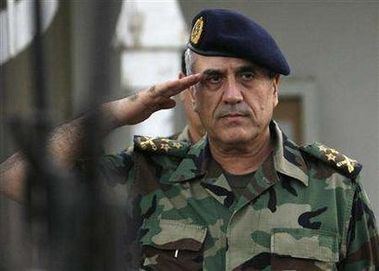 New york times, The political logjam over Lebanon
New york times, The political logjam over Lebanon
BEIRUT, Lebanon, Nov. 30 Lebanon’s parliament has postponed until Dec. 7 a session to select the country’s next president, the sixth time the election has been pushed back.In a statement issued by his office, Lebanese Speaker Nabih Berri said he took the action to permit further efforts to reach consensus on the election, The Lebanon […]



